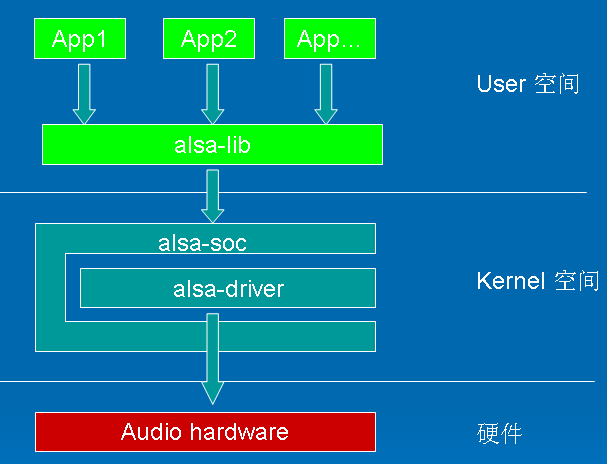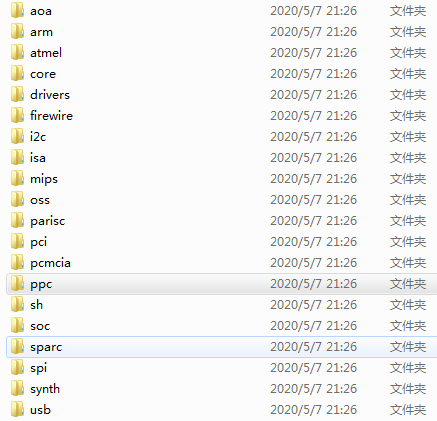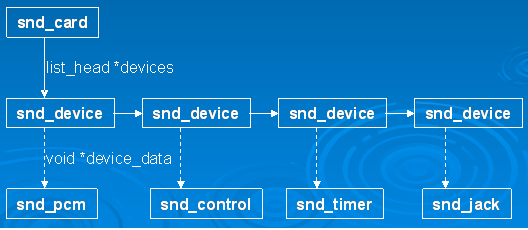linux-alsa详解1 基本知识
1 alsa的简单介绍
ALSA是Advanced Linux Sound Architecture 的缩写,目前已经成为了linux的主流音频体系结构。
在内核设备驱动层,ALSA提供了alsa-driver,同时在应用层,ALSA为我们提供了alsa-lib,应用程序只要调用alsa-lib提供的API,即可以完成对底层音频硬件的控制。linux内核中alsa的软件结构如下:

用户空间的alsa-lib对应用程序提供统一的API接口,这样可以隐藏了驱动层的实现细节,简化了应用程序的实现难度,内核空间中,alsa-soc其实是对alsa-driver的进一步封装,他针对嵌入式设备提供了一些列增强的功能。1
1.1 alsa的设备文件结构
1 $ cd /dev/snd 2 $ ls -l 3 crw-rw----+ 1 root audio 116, 8 2011-02-23 21:38 controlC0 4 crw-rw----+ 1 root audio 116, 4 2011-02-23 21:38 midiC0D0 5 crw-rw----+ 1 root audio 116, 7 2011-02-23 21:39 pcmC0D0c 6 crw-rw----+ 1 root audio 116, 6 2011-02-23 21:56 pcmC0D0p 7 crw-rw----+ 1 root audio 116, 5 2011-02-23 21:38 pcmC0D1p 8 crw-rw----+ 1 root audio 116, 3 2011-02-23 21:38 seq 9 crw-rw----+ 1 root audio 116, 2 2011-02-23 21:38 timer
可以看到以下设备文件:
1 controlC0 --> 用于声卡的控制,例如通道选择,混音,麦克控制,音量加减,开关等 2 midiC0D0 --> 用于播放midi音频 3 pcmC0D0c --> 用于录音的pcm设备 4 pcmC0D0p --> 用于播放的pcm设备 5 seq --> 音序器 6 timer --> 定时器
其中,C0D0代表的是声卡0中的设备0,pcmC0D0c最后一个c代表capture,pcmC0D0p最后一个p代表playback,这些都是alsa-driver中的命名规则,从上面的列表可以看出,我的声卡下挂了6个设备,根据声卡的实际能力,驱动实际上可以挂上更多种类的设备,在include/sound/core.h中,定义了以下设备类型,通常更关心的是pcm和control这两种设备.。
1 #define SNDRV_DEV_TOPLEVEL ((__force snd_device_type_t) 0) 2 #define SNDRV_DEV_CONTROL ((__force snd_device_type_t) 1) 3 #define SNDRV_DEV_LOWLEVEL_PRE ((__force snd_device_type_t) 2) 4 #define SNDRV_DEV_LOWLEVEL_NORMAL ((__force snd_device_type_t) 0x1000) 5 #define SNDRV_DEV_PCM ((__force snd_device_type_t) 0x1001) 6 #define SNDRV_DEV_RAWMIDI ((__force snd_device_type_t) 0x1002) 7 #define SNDRV_DEV_TIMER ((__force snd_device_type_t) 0x1003) 8 #define SNDRV_DEV_SEQUENCER ((__force snd_device_type_t) 0x1004) 9 #define SNDRV_DEV_HWDEP ((__force snd_device_type_t) 0x1005) 10 #define SNDRV_DEV_INFO ((__force snd_device_type_t) 0x1006) 11 #define SNDRV_DEV_BUS ((__force snd_device_type_t) 0x1007) 12 #define SNDRV_DEV_CODEC ((__force snd_device_type_t) 0x1008) 13 #define SNDRV_DEV_JACK ((__force snd_device_type_t) 0x1009) 14 #define SNDRV_DEV_COMPRESS ((__force snd_device_type_t) 0x100A) 15 #define SNDRV_DEV_LOWLEVEL ((__force snd_device_type_t) 0x2000)
1.2 linux/sound 下alsa目录

各主要子目录的作用:
1 core 该目录包含了ALSA驱动的中间层,它是整个ALSA驱动的核心部分 2 core/oss 包含模拟旧的OSS架构的PCM和Mixer模块 3 core/seq 有关音序器相关的代码 4 include ALSA驱动的公共头文件目录,该目录的头文件需要导出给用户空间的应用程序使用,通常,驱动模块私有的头文件不应放置在这里 5 drivers 放置一些与CPU、BUS架构无关的公用代码 6 i2c ALSA自己的I2C控制代码 7 pci pci声卡的顶层目录,子目录包含各种pci声卡的代码 8 isa isa声卡的顶层目录,子目录包含各种isa声卡的代码 9 soc 针对system-on-chip体系的中间层代码 10 soc/codecs 针对soc体系的各种codec的代码,与平台无关
2 声卡结构体
2.1 结构体snd_card
snd_card可以说是整个ALSA音频驱动最顶层的一个结构,整个声卡的软件逻辑结构开始于该结构,几乎所有与声音相关的逻辑设备都是在snd_card的管理之下,声卡驱动的第一个动作通常就是创建一个snd_card结构体。
定义位于:include\sound\core.h
1 /* main structure for soundcard */ 2 3 struct snd_card { 4 int number; /* number of soundcard (index to //soundcard的序号,通常为0 5 snd_cards) */ 6 7 char id[16]; /* id string of this card */ //card的标识符,通常是字符串形式。 8 char driver[16]; /* driver name */ 9 char shortname[32]; /* short name of this soundcard */ 10 char longname[80]; /* name of this soundcard */ //会在具体驱动中设置,主要反映在/proc/asound/cards中 11 char mixername[80]; /* mixer name */ 12 char components[128]; /* card components delimited with 13 space */ 14 struct module *module; /* top-level module */ 15 16 void *private_data; /* private data for soundcard */声卡的私有数据,可以在创建声卡时通过参数指定数据的大小 17 void (*private_free) (struct snd_card *card); /* callback for freeing of 18 private data */ 19 struct list_head devices; /* devices */记录该声卡下所有逻辑设备的链表 20 21 unsigned int last_numid; /* last used numeric ID */ 22 struct rw_semaphore controls_rwsem; /* controls list lock */ 23 rwlock_t ctl_files_rwlock; /* ctl_files list lock */ 24 int controls_count; /* count of all controls */ 25 int user_ctl_count; /* count of all user controls */ 26 struct list_head controls; /* all controls for this card */ //记录该声卡下所有控制单元的链表 27 struct list_head ctl_files; /* active control files *//用于管理该card下的active的control设备 28 struct mutex user_ctl_lock; /* protects user controls against 29 concurrent access */ 30 31 struct snd_info_entry *proc_root; /* root for soundcard specific files */ 32 struct snd_info_entry *proc_id; /* the card id */ 33 struct proc_dir_entry *proc_root_link; /* number link to real id */ 34 35 struct list_head files_list; /* all files associated to this card */ 36 struct snd_shutdown_f_ops *s_f_ops; /* file operations in the shutdown 37 state */ 38 spinlock_t files_lock; /* lock the files for this card */ 39 int shutdown; /* this card is going down */ 40 int free_on_last_close; /* free in context of file_release */ 41 wait_queue_head_t shutdown_sleep; 42 atomic_t refcount; /* refcount for disconnection */ 43 struct device *dev; /* device assigned to this card */ //和card相关的设备 44 struct device *card_dev; /* cardX object for sysfs */ //card用于在sys中显示,用于代表该card 45 46 #ifdef CONFIG_PM 47 unsigned int power_state; /* power state */ 48 struct mutex power_lock; /* power lock */ 49 wait_queue_head_t power_sleep; 50 #endif 51 52 #if defined(CONFIG_SND_MIXER_OSS) || defined(CONFIG_SND_MIXER_OSS_MODULE) 53 struct snd_mixer_oss *mixer_oss; 54 int mixer_oss_change_count; 55 #endif 56 }
snd_card的driver字段保存着芯片的ID字符串,user空间的alsa-lib会使用到该字符串,所以必须要保证该ID的唯一性.shortname字段更多地用于打印信息,longname字段则会出现在/proc/asound/cards中。
3 声卡的创建
3.1 声卡创建函数snd_card_new
定义位于:sound\core\init.c
创建并初始化声卡结构体
1 /** 2 * snd_card_new - create and initialize a soundcard structure 3 * @parent: the parent device object 4 * @idx: card index (address) [0 ... (SNDRV_CARDS-1)]//一个整数值,该声卡的编号 5 * @xid: card identification (ASCII string)//字符串,声卡的标识符 6 * @module: top level module for locking 7 * @extra_size: allocate this extra size after the main soundcard structure//该参数决定在创建snd_card实例时,需要同时额外分配的私有数据的大小,该数据的指针最终会赋值给snd_card的private_data数据成员 8 * @card_ret: the pointer to store the created card instance//返回所创建的snd_card实例的指针 9 * 10 * Creates and initializes a soundcard structure. 11 * 12 * The function allocates snd_card instance via kzalloc with the given 13 * space for the driver to use freely. The allocated struct is stored 14 * in the given card_ret pointer. 15 * 16 * Return: Zero if successful or a negative error code. 17 */ 18 int snd_card_new(struct device *parent, int idx, const char *xid, 19 struct module *module, int extra_size, 20 struct snd_card **card_ret) 21 { 22 struct snd_card *card;//创建一个声卡实例 23 int err; 24 25 if (snd_BUG_ON(!card_ret)) 26 return -EINVAL; 27 *card_ret = NULL; 28 29 if (extra_size < 0) 30 extra_size = 0; 31 card = kzalloc(sizeof(*card) + extra_size, GFP_KERNEL);////根据extra_size参数的大小分配内存,该内存区可以作为芯片的专有数据使用 32 if (!card) 33 return -ENOMEM; 34 if (extra_size > 0) 35 card->private_data = (char *)card + sizeof(struct snd_card); 36 if (xid) 37 strlcpy(card->id, xid, sizeof(card->id));////拷贝声卡的ID字符串 38 err = 0; 39 mutex_lock(&snd_card_mutex); 40 if (idx < 0) /* first check the matching module-name slot */// //如果传入的声卡编号为-1,自动分配一个索引编号 41 idx = get_slot_from_bitmask(idx, module_slot_match, module); 42 if (idx < 0) /* if not matched, assign an empty slot */ 43 idx = get_slot_from_bitmask(idx, check_empty_slot, module); 44 if (idx < 0) 45 err = -ENODEV; 46 else if (idx < snd_ecards_limit) { 47 if (test_bit(idx, snd_cards_lock)) 48 err = -EBUSY; /* invalid */ 49 } else if (idx >= SNDRV_CARDS) 50 err = -ENODEV; 51 if (err < 0) { 52 mutex_unlock(&snd_card_mutex); 53 dev_err(parent, "cannot find the slot for index %d (range 0-%i), error: %d\n", 54 idx, snd_ecards_limit - 1, err); 55 kfree(card); 56 return err; 57 } 58 set_bit(idx, snd_cards_lock); /* lock it */ 59 if (idx >= snd_ecards_limit) 60 snd_ecards_limit = idx + 1; /* increase the limit */ 61 mutex_unlock(&snd_card_mutex); 62 /*初始化snd_card结构中必要的字段*/ 63 card->dev = parent; 64 card->number = idx; 65 card->module = module; 66 INIT_LIST_HEAD(&card->devices); 67 init_rwsem(&card->controls_rwsem); 68 rwlock_init(&card->ctl_files_rwlock); 69 mutex_init(&card->user_ctl_lock); 70 INIT_LIST_HEAD(&card->controls); 71 INIT_LIST_HEAD(&card->ctl_files); 72 spin_lock_init(&card->files_lock); 73 INIT_LIST_HEAD(&card->files_list); 74 #ifdef CONFIG_PM 75 mutex_init(&card->power_lock); 76 init_waitqueue_head(&card->power_sleep); 77 #endif 78 79 device_initialize(&card->card_dev); 80 card->card_dev.parent = parent; 81 card->card_dev.class = sound_class; 82 card->card_dev.release = release_card_device; 83 card->card_dev.groups = card->dev_groups; 84 card->dev_groups[0] = &card_dev_attr_group; 85 err = kobject_set_name(&card->card_dev.kobj, "card%d", idx); 86 if (err < 0) 87 goto __error; 88 89 snprintf(card->irq_descr, sizeof(card->irq_descr), "%s:%s", 90 dev_driver_string(card->dev), dev_name(&card->card_dev)); 91 92 /* the control interface cannot be accessed from the user space until */ 93 /* snd_cards_bitmask and snd_cards are set with snd_card_register */ 94 err = snd_ctl_create(card);//建立逻辑设备:Control 95 if (err < 0) { 96 dev_err(parent, "unable to register control minors\n"); 97 goto __error; 98 } 99 err = snd_info_card_create(card);//建立proc文件中的info节点:通常就是/proc/asound/card0 100 if (err < 0) { 101 dev_err(parent, "unable to create card info\n"); 102 goto __error_ctl; 103 } 104 *card_ret = card; 105 return 0; 106 107 __error_ctl: 108 snd_device_free_all(card); 109 __error: 110 put_device(&card->card_dev); 111 return err; 112 }
3.2 声卡的注册snd_card_register()
定义位于:在/sound/core/init.c中
1 /** 2 * snd_card_register - register the soundcard 3 * @card: soundcard structure 4 * 5 * This function registers all the devices assigned to the soundcard. 6 * Until calling this, the ALSA control interface is blocked from the 7 * external accesses. Thus, you should call this function at the end 8 * of the initialization of the card. 9 * 10 * Return: Zero otherwise a negative error code if the registration failed. 11 */ 12 int snd_card_register(struct snd_card *card) 13 { 14 int err; 15 16 if (snd_BUG_ON(!card)) 17 return -EINVAL; 18 19 if (!card->card_dev) { 20 card->card_dev = device_create(sound_class, card->dev,//创建sysfs下的设备 21 MKDEV(0, 0), card, 22 "card%i", card->number); 23 if (IS_ERR(card->card_dev)) 24 card->card_dev = NULL; 25 } 26 /*注册所有挂在该声卡下的逻辑设备,snd_device_register_all()实际上是通过snd_card的devices链表,遍历所有的snd_device,并且调用snd_device的ops->dev_register()来实现各自设备的注册的*/ 27 if ((err = snd_device_register_all(card)) < 0) 28 return err; 29 mutex_lock(&snd_card_mutex); 30 if (snd_cards[card->number]) { 31 /* already registered */ 32 mutex_unlock(&snd_card_mutex); 33 return 0; 34 } 35 if (*card->id) { 36 /* make a unique id name from the given string */ 37 char tmpid[sizeof(card->id)]; 38 memcpy(tmpid, card->id, sizeof(card->id)); 39 snd_card_set_id_no_lock(card, tmpid, tmpid); 40 } else { 41 /* create an id from either shortname or longname */ 42 const char *src; 43 src = *card->shortname ? card->shortname : card->longname; 44 snd_card_set_id_no_lock(card, src, 45 retrieve_id_from_card_name(src)); 46 } 47 snd_cards[card->number] = card; 48 mutex_unlock(&snd_card_mutex); 49 init_info_for_card(card); 50 #if defined(CONFIG_SND_MIXER_OSS) || defined(CONFIG_SND_MIXER_OSS_MODULE) 51 if (snd_mixer_oss_notify_callback) 52 snd_mixer_oss_notify_callback(card, SND_MIXER_OSS_NOTIFY_REGISTER); 53 #endif /*建立一些相应的proc和sysfs下的文件或属性节点*/ 54 if (card->card_dev) { 55 err = device_create_file(card->card_dev, &card_id_attrs); 56 if (err < 0) 57 return err; 58 err = device_create_file(card->card_dev, &card_number_attrs); 59 if (err < 0) 60 return err; 61 } 62 63 return 0; 64 }
3.3 sound_class创建
1 static int __init init_soundcore(void) 2 { 3 int rc; 4 5 rc = init_oss_soundcore(); 6 if (rc) 7 return rc; 8 9 sound_class = class_create(THIS_MODULE, "sound");//创建sound_class 10 if (IS_ERR(sound_class)) { 11 cleanup_oss_soundcore(); 12 return PTR_ERR(sound_class); 13 } 14 15 sound_class->devnode = sound_devnode; 16 17 return 0; 18 }
sound_devnode的定义:
1 static char *sound_devnode(struct device *dev, umode_t *mode) 2 { 3 if (MAJOR(dev->devt) == SOUND_MAJOR) 4 return NULL; 5 return kasprintf(GFP_KERNEL, "snd/%s", dev_name(dev)); 6 }
subsys_initcall(init_soundcore); #define subsys_initcall(fn) module_init(fn)
函数init_soundcore是sound_core.c的入口函数。
3.4 创建声卡的各种部件
主要包括:pcm 、mixer、MIDI等。之前snd_card结构体的devices字段,每一种部件的创建最终会调用snd_device_new()来生成一个snd_device实例,并把该实例链接到snd_card的devices链表中.。
通常,alsa-driver的已经提供了一些常用的部件的创建函数,而不必直接调用snd_device_new(),如下:
1 PCM ---- snd_pcm_new() 2 RAWMIDI -- snd_rawmidi_new() 3 CONTROL -- snd_ctl_create() 4 TIMER -- snd_timer_new() 5 INFO -- snd_card_proc_new() 6 JACK -- snd_jack_new()
创建之后声卡的逻辑结构如下:

4 声卡初始化
定义位于:sound\core\sound.c
sonud.c的入口函数:
申请一个字符设备的主设备号。control、pcm等逻辑设备都是这个主设备号下的次设备。
1 /* 2 * INIT PART 3 */ 4 5 static int __init alsa_sound_init(void) 6 { 7 snd_major = major; 8 snd_ecards_limit = cards_limit; 9 if (register_chrdev(major, "alsa", &snd_fops)) {//获取字符设备主设备号,即声卡的主设备号,其他声卡设备都是其下的次设备 10 pr_err("ALSA core: unable to register native major device number %d\n", major); 11 return -EIO; 12 } 13 if (snd_info_init() < 0) { 14 unregister_chrdev(major, "alsa"); 15 return -ENOMEM; 16 } 17 #ifndef MODULE 18 pr_info("Advanced Linux Sound Architecture Driver Initialized.\n"); 19 #endif 20 return 0; 21 }
次设备共用一个open接口,然后根据下面的全局数组snd_minors找到相应的次设备文件操作结构体,分别调用相应次设备的open函数。snd_fops的定义:
1 static const struct file_operations snd_fops = 2 { 3 .owner = THIS_MODULE, 4 .open = snd_open, 5 .llseek = noop_llseek, 6 };
snd_open函数定义:
1 static int snd_open(struct inode *inode, struct file *file) 2 { 3 unsigned int minor = iminor(inode);//声卡下的次设备 4 struct snd_minor *mptr = NULL; 5 const struct file_operations *new_fops; 6 int err = 0; 7 8 if (minor >= ARRAY_SIZE(snd_minors)) 9 return -ENODEV; 10 mutex_lock(&sound_mutex); 11 mptr = snd_minors[minor];//获取到具体的声卡设备,即次设备比如control/pcm设备等 12 if (mptr == NULL) { 13 mptr = autoload_device(minor); 14 if (!mptr) { 15 mutex_unlock(&sound_mutex); 16 return -ENODEV; 17 } 18 } 19 new_fops = fops_get(mptr->f_ops);//获取次设备的f_ops文件操作结构体 20 mutex_unlock(&sound_mutex); 21 if (!new_fops) 22 return -ENODEV; 23 replace_fops(file, new_fops);//用次设备的文件操作结构体替换 24 25 if (file->f_op->open) 26 err = file->f_op->open(inode, file);//执行次设备的文件open函数 27 return err; 28 }
snd_minors是定义在sound.c中的全局变量,表示主设备号下的次设备比如control、pcm设备等,inode作为snd_minors的下表,找到对应的次设备。
static struct snd_minor *snd_minors[SNDRV_OS_MINORS];
结构体定义,包含设备类型、声卡编号、设备
1 struct snd_minor { 2 int type; /* SNDRV_DEVICE_TYPE_XXX */ 3 int card; /* card number */ 4 int device; /* device number */ 5 const struct file_operations *f_ops; /* file operations */ 6 void *private_data; /* private data for f_ops->open */ 7 struct device *dev; /* device for sysfs */ 8 struct snd_card *card_ptr; /* assigned card instance */ 9 }
设备类型:
定义位于:include\sound\minors.h
1 enum { 2 SNDRV_DEVICE_TYPE_CONTROL, 3 SNDRV_DEVICE_TYPE_SEQUENCER, 4 SNDRV_DEVICE_TYPE_TIMER, 5 SNDRV_DEVICE_TYPE_HWDEP, 6 SNDRV_DEVICE_TYPE_RAWMIDI, 7 SNDRV_DEVICE_TYPE_PCM_PLAYBACK, 8 SNDRV_DEVICE_TYPE_PCM_CAPTURE, 9 SNDRV_DEVICE_TYPE_COMPRESS, 10 };
参考博文:
https://www.cnblogs.com/jason-lu/archive/2013/06/07/3123571.html



